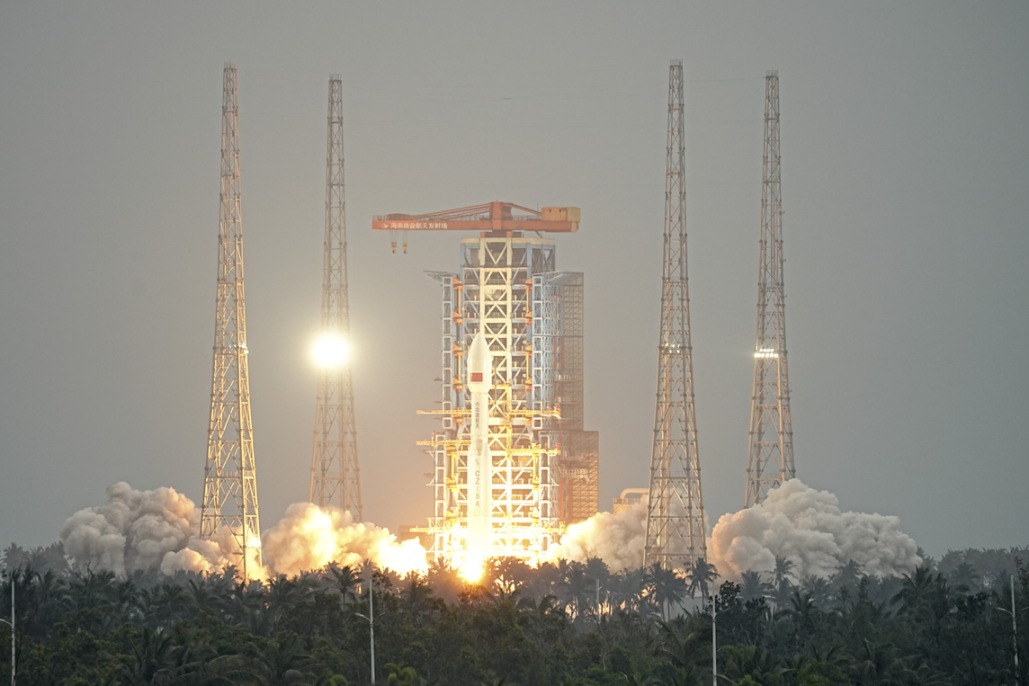Green and renewable, bamboo takes on plastic

NANCHANG — In the offices of a bamboo manufacturer in Tonggu county in Jiangxi province, all the keyboards, mouse pads, pens and calculators are made of bamboo.
"These products have all been developed by our company, and we have been able to make bamboo a substitute for plastic in some electronic products," said Feng Xumou, chairman of the Jiangxi Bamboo Technology Development, which has specialized in working with the natural material for 25 years.
Tonggu county has an 88.04 percent forest coverage rate and has 30,667 hectares of lush bamboo forests, making it one of the main bamboo production areas in East China.
"The county's extensive bamboo resources have created favorable conditions for the development of our company," said Feng, adding that it has developed around 30 bamboo products including tables, tableware, speakers and even skis.
"It is not easy to make a bamboo keyboard, but we persevered. We all know that bamboo is an environmentally-friendly and renewable material with tremendous development potential," Feng said.
It took the company nine months to develop its first bamboo keyboard, which integrated a bamboo frame with plastic keys, and another two years to develop an all-bamboo keyboard.
In 2012, it began to gain traction at home and abroad and since then, about 5 million units have been sold.
"About 400 grams of plastic are needed to make a keyboard, so the bamboo keyboards we've made over the years have eliminated the use of almost 2,000 metric tons of plastic," Feng said.
As one of the largest countries and home to extensive bamboo forests, China has the most abundant bamboo resources in the world, and its bamboo products and exports are among the top, globally.
Last year, together with the International Bamboo and Rattan Organization, the Chinese government launched the Bamboo as a Substitute for Plastic Initiative to encourage countries to reduce plastic pollution and address climate change.
So far, bamboo products produced by Feng's company have been exported to 20 countries and regions, producing an average annual export value of $10 million.
The company also provides employment opportunities for 90 villagers and has helped boost the development of local bamboo and charcoal factories.
"We optimize our use of bamboo and send surplus byproducts like bamboo powder to charcoal factories to make bamboo charcoal, which is a more environmentally-friendly fuel source," Feng said.
With some 3.3 hectares of bamboo under cultivation, 46-year-old Jiang Zhaochun makes his living from the plant.
"As long as you get the timing and method right, cutting bamboo does not damage the bamboo forest," Jiang said.
"On the contrary, cutting mature bamboo is a way of protecting the forest because if they aren't cut down, the older branches die and take nutrients from the younger ones."
Not far from Feng's company, the Jiangxi Jinzhu Industrial Company, specializes in making bamboo toothpicks and is currently operating at full speed.
"Our products have been exported to 35 countries and regions, and our annual output value is over 40 million yuan," said Tu Qiang, deputy general manager, adding that he is optimistic about the prospects for bamboo products.
Now home to 43 bamboo processing companies, Tonggu county has a relatively complete industrial chain and has introduced many supporting measures.
Xinhua
- China adopts revised Civil Aviation Law
- China launches satellite to aid in early extreme weather detection
- Report on mining accident that killed 6 suggests accountability for 42 individuals
- Law aimed at bolstering standard Chinese language education passed
- Connecting cities, changing lives
- World's longest expressway tunnel opens to traffic





































